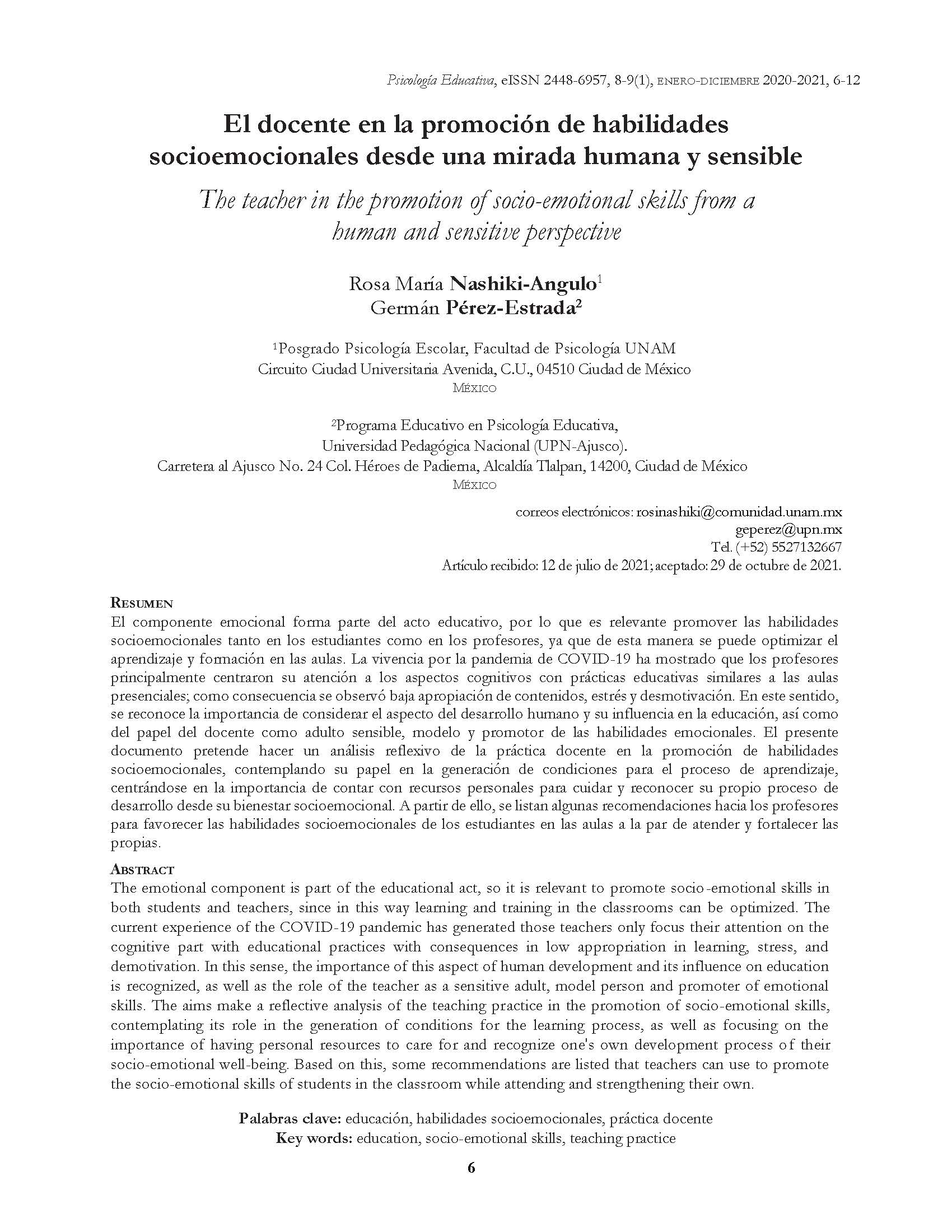Abstract
The emotional component is part of the educational act, so it is relevant to promote socio-emotional skills in both students and teachers, since in this way learning and training in the classrooms can be optimized. The current experience of the COVID-19 pandemic has generated those teachers only focus their attention on the cognitive part with educational practices with consequences in low appropriation in learning, stress, and demotivation. In this sense, the importance of this aspect of human development and its influence on education is recognized, as well as the role of the teacher as a sensitive adult, model person and promoter of emotional skills. The aims make a reflective analysis of the teaching practice in the promotion of socio-emotional skills, contemplating its role in the generation of conditions for the learning process, as well as focusing on the importance of having personal resources to care for and recognize one's own development process of their socio-emotional well-being. Based on this, some recommendations are listed that teachers can use to promote the socio-emotional skills of students in the classroom while attending and strengthening their own.
References
Arias, E., Hincapié, D., Paredes, D. (2020). Educar para la vida. El desarrollo de habilidades socioemocionales y el rol de los docentes. Banco Interamericano de Desarrollo (BID)
Bisquerra Alzina, R., y Pérez Escoda, N. (2012). Educación emocional: estrategias para su puesta en práctica. Avances en Supervisión Educativa, (16).
Bisquerra, R. (2018). Educación emocional para el desarrollo integral en secundaria. Reflexión Aula de Secundaria 28. EN PROFUNDIDAD.
Bisquerra, R. (2020, octubre). Educación socioemocional y bienestar. Conferencia Magistral en el V Congreso de Investigación en Gestión del Talento Humano (CIGETH 2020) México: Centro Universitario CIFE
Diaz Barriga, F. (2020, noviembre). Interacción docente-estudiante en la educación a distancia. Conferencia para el Programa de Desarrollo e Innovación Docente PDID2019 Ibero, Universidad Iberoamericana https://www.youtube.com/watch?v=fw7CLgz52Fs
Filella Guiu, G., Pérez Escoda, N., Agulló, M. J., y Granado, X. O. (2014). Resultados de la aplicación de un programa de educación emocional en Educación Primaria. Estudios sobre educación, 26, 125-147.
Hartley, J. (s.f). Perfil del Docente Socioemocionalmente Competente UNESCO.MINEDU.
https://es.unesco.org/sites/default/files/perfil_del_docente_socioemocionalmente_competente-jh.pdf.
Maturana, H. & Pörksen, B. (2010). Del ser al hacer. Los orígenes de la biología del conocer. Buenos Aires: Granica.
Maturana, H. (2020) La objetividad, un argumento para obligar. Paidós: Chile
Ortiz Ocaña, A. (2015). La concepción de Maturana acerca de la conducta y el lenguaje humano. CES Psicología, 8(2),182-199.
Papadimitriou, G. y Romo, S. (2005). Capacidades y competencias para la resolución noviolenta de conflictos. México: McGraw-Hill/Interamericana Editores.
Santos López, V.M. (2020, octubre). El cuerpo emocional, una mirada a las emociones en el marco de la antropología física. Conferencia en el V Congreso de Investigación en Gestión del Talento Humano (CIGETH-2020). México: Centro Universitario CIFE.
Tobón, S. (2020, octubre) Habilidades socioemocionales: evaluación y desarrollo mediante la metodología de proyectos. Conferencia Magistral en el V Congreso de Investigación en Gestión del Talento Humano (CIGETH 2020) México: Centro Universitario CIFE
Torres, E. F. (2020, octubre). Habilidades socioemocionales en el docente del siglo XXI. Ponencia presentada en el V Congreso de Investigación en Habilidades Socioemocionales, Coaching y Talento (CIGETH 2020) México: Centro Universitario CIFE

This work is licensed under a Creative Commons Attribution-NonCommercial-NoDerivatives 4.0 International License.
Copyright (c) 2024 Universidad Nacional Autónoma de México


